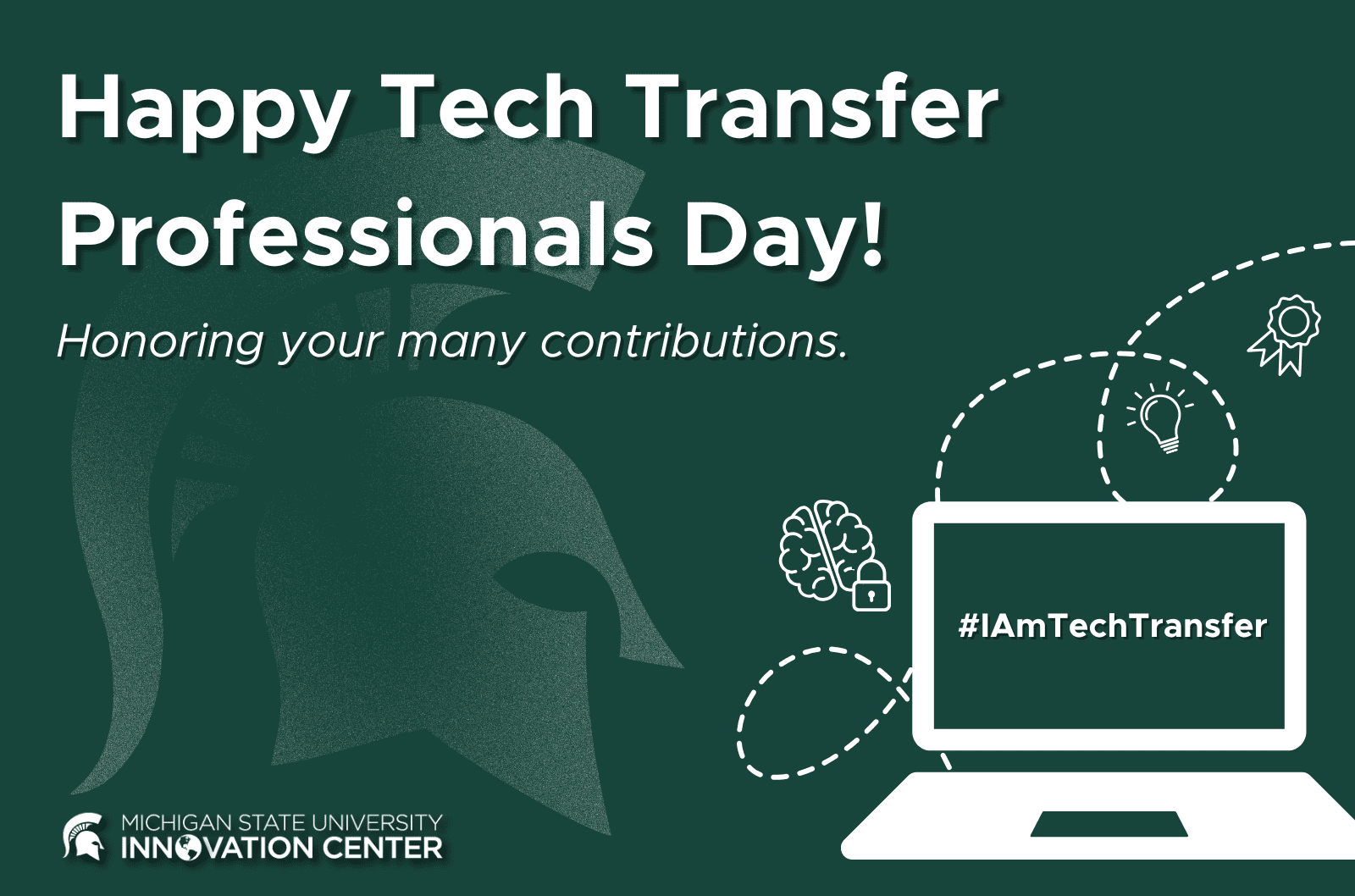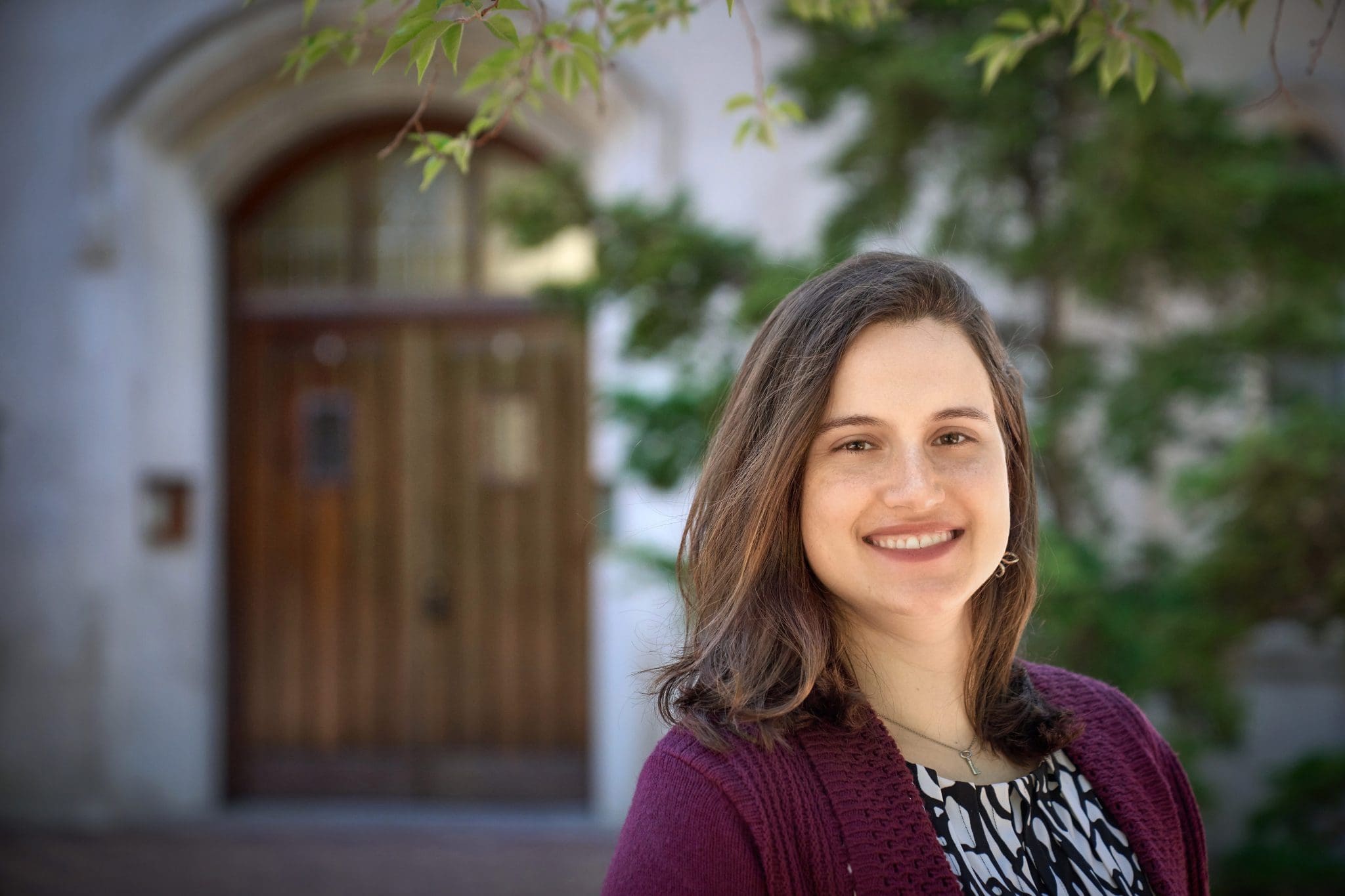
In celebration of Technology Transfer Professionals Day, we talked with Ray DeVito and Julia Miller, who both play a pivotal part in transforming academic research into real-world innovations in their positions as Technology Managers at MSU Technologies.
With more than 15 years of combined experience at MSU, they were kind enough to sit down with us and offer a peek into the role Technology Managers play in bringing new innovations from the lab to the marketplace.
We asked Ray and Julia to tell us a little about their backgrounds, how they got into the field of university technology commercialization, what tips they have to offer faculty innovators, and how their work has helped make the world a better place.
Could you walk through how you typically work with faculty members, from initial invention disclosure to commercialization? How do you identify and evaluate promising technologies for commercialization?
Julia: Often, the first time I learn about a new technology is once the Invention Disclosure is submitted, but some faculty members like to discuss their technologies before disclosure. If this is the first time that the faculty member has submitted a disclosure, I provide information about the process. The screening process is focused on understanding the science of the technology, potential intellectual property protection strategies, and potential markets. Many technologies come to us either very early in their development or are so cutting-edge that potential markets could be unclear.
Ray: When we receive a new Invention Disclosure, we start by becoming aware of the subject and getting a rudimentary understanding of the technology. We try to interact early with the faculty inventor to understand their ideas about the invention, the motivations, and where they think it is useful. Next is a deeper dive into the potential patentability of the invention, what problem the invention is solving, what other products or technologies are applicable, and how big the commercial opportunity is. With a promising invention, we seek out potential commercial parties that might be interested and who have the capability to bring products to market.
What advice would you give to faculty members considering commercializing their research?

Julia: It is hard to disclose a technology too early, but you can disclose a technology too late. Even if your technology is still an idea or just a basic diagram on a napkin, we can work together to clarify the technology’s technical, intellectual property, and market aspects; too late, and certain types of intellectual property protection cannot be obtained. Commercialization can be a long process. Most technologies are disclosed at an early stage, and usually, further basic research needs to be done. The patenting process is also a multi-year process, and once we find a commercialization partner, they need time to develop the technology into a product or service.
Ray: For commercialization that will rely on obtaining patents, timing is important, so early disclosure is best. We can both publish and patent if we get the timing right. Moving university research into commercial products can be a long process. Fortunately, at MSU, there is a dedicated group experienced in this process to help move the projects along, allowing faculty researchers to maintain their academic pursuits while commercialization projects are maturing.
How did you become involved in the field of university technology commercialization?
Julia: While I was completing my Ph.D. studies in Plant Biology at Cornell University, I realized that while I still enjoyed learning about science, I no longer wanted to be the person in the lab doing the science. I started to investigate other career paths that had a scientific component and learned about technology transfer and commercialization. I did an internship at Cornell’s technology transfer office to learn about the basics of university technology transfer and commercialization. I really enjoyed my internship, so I looked for technology transfer positions once I graduated. At that time, MSU Technologies had a technology transfer fellow position open which focused on plant sciences and agriculture. Since that was my technical background, I decided to apply and learned a great deal during the fellowship. I was then able to transition to the technology manager position, which is my current role at MSUT.
Ray: Prior to a new career in university technology commercialization, I was involved in in-licensing and sponsoring research in my business career. I was very intrigued with the wonderful range of research and technology activities that were taking place at universities. When the appropriate opportunity arose, I left the business world and transitioned to academic technology commercialization.
For someone considering a career in technology transfer, what skills and background do you think are most valuable for success in technology transfer?

Julia: Good communication skills are important, as you are constantly communicating with researchers and potential licensees and need to be able to ‘translate’ technical information into language that a patent attorney or business development lead can understand. Project management skills are useful, as you will be juggling different projects with different timelines. You need to be flexible and open as each day, and each project can be different. For background, either having technical experience (e.g., an advanced degree in science or engineering), law experience, or business experience is important.
Ray: Academic technology commercialization roles are for people who desire an ongoing stream of fresh projects over a range of subjects. No two projects are identical. If you are motivated by solving multi-faceted problems across technology, intellectual property law, and business concerns, these projects will keep you going.
For practical skills, one should gain an understanding of intellectual property, broad scientific knowledge, and an understanding of how commercial markets work. One needs to become a fast learner on new subject matter. Most important is curiosity and a desire to learn new things.
Can you share an example of how you’ve helped a faculty member transform their early-stage research into a commercially viable technology or of a successful licensing deal or startup you helped to facilitate?
Julia: Dr. Cholani Weebadde, Associate Professor and Plant Breeder, works with strawberries – an important crop in Michigan with over 700 acres of fields. Dr. Weebadde inherited a population of strawberry lines and continued crossing and breeding to develop lines with increased fruit size, flavor, and disease resistance. I worked with her to apply for translational funding to support a yield trial. We completed the trial in 2023, identifying three top-performing lines. I then contacted local growers in Michigan and regional nurseries to trial these lines. We hope to have licensees identified in the next year or so. In parallel, we applied for a follow-on grant to evaluate her top-performing lines for greenhouse production, which is an area of increasing interest.
Ray: Switched Source is a growing startup developing novel technology for application to the electric power grid. Through a license with MSU, they had possession of a demonstrated technology needing transformation into a commercial product in a very competitive, demanding, and regulated space. MSU resources combined with Switched Source’s perseverance and technical excellence allowed the company to continue to move the very complex product development towards deployment into the power grid.
###
About the MSU Innovation Center:
The MSU Innovation Center combines research partnerships, technology transfer, and startup support for MSU faculty who aim to see their research applied to make the world a better place.
Composed of Business Connect, MSU Technologies, and Spartan Innovations, the MSU Innovation Center aims to amplify the impact of faculty research and drive economic growth while positively impacting society to solve real-world challenges with cutting-edge ideas.
Through mutually beneficial, long-term partnerships with the private sector, we connect MSU faculty with companies for corporate-sponsored research collaborations. We also play a key role in facilitating the commercialization and public use of technologies and copyrightable materials, moving MSU’s innovations from the lab to the marketplace. Importantly, we provide significant support for faculty entrepreneurs in establishing startup companies based on technologies developed at MSU.
